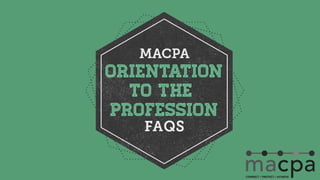Orientation to the Profession: FAQ
- 3. Rebekah Brown, CPA Manager, Membership engagement & Development Tom Hood, CPA, CITP, CGMA Chief Executive Officer
- 4. What
- 5. Certified Public Accountant: CFO Advisor Consultant Auditor Financial Analyst a trusted financial advisor who helps individuals, businesses, and other organizations plan and reach their financial goals. Tax Guru Controller
- 6. CPA Profession 1 - A distinct and evolving body of knowledge 2 - A commitment to the public interest - State Licensed 3 - A code of conduct and ethics
- 7. Why
- 8. As recognizable as & 6 of Top 25 Jobs in America Top 5 Job in Stem Top 5 Job in Business Top 10 Highest Paying In Demand Jobs
- 9. Where
- 11. Who
- 12. YOU!
- 13. How
- 14. Four Es to become a CPA Education- Bachelor's degree (120 credits) + 30 credits Examination - Uniform CPA exam Ethics - AICPA ethics course and exam Experience - 1 year of experience working with a CPA
- 15. FAQs
- 16. Do I have to have a degree in accounting? No! While there are certain course requirements you need to fulfill, the degree can be in any subject. Do I have to get a masters degree? No! The 30 additional credit hours can be in anything. Some people chose to fulfill this by receiving a masters degree, some fulfill it through doing additional undergrad courses. The credits just need to appear on a transcript of an accredited university. Education FAQs
- 17. I have a degree from a non US college or university, does this count? Education FAQs Maybe. Internationals seeking to use education from a foreign university must go through the NASBA International Evaluation Service to have their foreign degree approved to be eligible.
- 18. Exam FAQs REG 3 (4) hours 72 (70-75) MC 6 (8-9) Simulations FAR 4 hours 90 (60-65) MC 7 (8-9) Simulations AUDIT 4 hours 90 (70-75) MC 7 (8-9) Simulations BEC 3 (4) hours 72 (60-65) MC (4-5 Simulations) 3 Written Tasks (2017 Changes)
- 19. Should I get a review course? Yes! While most of the concepts you should have learned at some point in school, there are some that you just might have forgotten or never learned. Which review course should i use? While we donĪ»t recommend a particular course, we do suggest considering the following when choosing: How do you learn best, in a classroom or independently? Is there one your employer helps to pay for? What is your timeline? What is your budget? Exam FAQs
- 20. Exam FAQs How long do I have to pass the exam? After receiving a passing grade of 75 or better on one section of the exam, you have 18 months to pass the remaining 3 sections. If you do not complete the remaining sections in this time period the passed exam expires and you must retake it. When can i take the exam? There are four testing windows throughout the year with 4 Ī░blackoutĪ▒ months*. Any exam can be taken during these times, but the same section cannot be taken more than once during a window.
- 21. Ethics FAQs I have taken an ethics course in college, does that count? No. Maryland requires you take and pass AICPAĪ»s "Professional Ethics: The AICPA's Comprehensive Course"
- 22. Does my internship count? Yes! Internship experience can count. However all experience must have been earned no earlier than 3 years prior to application. Who can sign off on my RPE? A licensed CPA must sign off on your Report of Practical Experience. This person does not however need to be your direct supervisor. They just need to be able to attest to your experience. Experience FAQs
- 27. Questions? Rebekah Brown Rebekah@macpa.org // Support@macpa.org @RJBrownCPA slideshare.net/rjbrowncpa linkedin.com/in/rebekahbrown Tom Hood Tom@macpa.org @TomHood slideshare.net/thoodcpa linkedin.com/in/tomhood



























